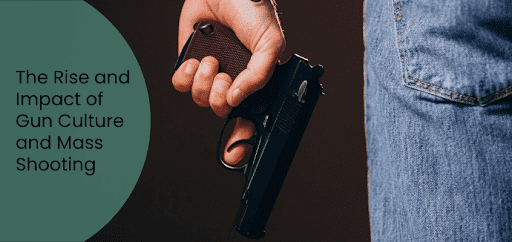Introduction.
The images of sad, sobbing family members, scared children, and shattered towns have become too familiar in the aftermath of mass shootings in America. There are many factors to the rise in mass shootings, and their connection with gun culture includes increased mental health-related issues, government laws and legislative procedures. Every year, gun violence causes over 31,000 fatalities and 78,000 nonfatal injuries in the United States. Corporations, individuals, and many more are working to reduce violence. They promote the well-being of children and young people across the United States.
Our Wellness Programs
What is gun culture/mass shooting?
Guns have traditionally been present in America, widespread private access exists, and the government has not claimed a distinct unprecedented. In simple terms, gun culture includes a system of social constructs. A complex understanding of cognitive and ethical systems that affects the inheritance of weapons as both items and drivers of the culture of the United States. It demonstrates how people and organisations engage with firearms consciously and subconsciously. There is a correlation between beliefs, ideas, actions, social and legal conventions, and the gun culture in the United States. Additionally, social systems can also play a huge role.
The U.S. Constitution’s Second Amendment guarantees the right to keep and bear arms, and around 30% of the American population takes advantage of this privilege. A mass shooting is a single occurrence, and several individuals are shot with one or more weapons, mainly when the perpetrator selects the casualties randomly. While there is no national definition for “mass shootings,” the F.B.I. has been tracking “active shooter occurrences” for over a decade, which are defined as “a person actively engaged in murdering or trying to kill individuals in a crowded location.”
Looking for services related to this subject? Get in touch with these experts today!!
Experts

Banani Das Dhar

India
Wellness Expert
Experience: 7 years

Devika Gupta

India
Wellness Expert
Experience: 4 years

Trupti Rakesh valotia

India
Wellness Expert
Experience: 3 years

Sarvjeet Kumar Yadav

India
Wellness Expert
Experience: 15 years

Shubham Baliyan

India
Wellness Expert
Experience: 2 years
What is the role of the N.R.A. in gun culture/mass shootings?
The National Rifle Association (N.R.A.) stands for the National Rifle Association. It was created in 1871 as a leisure association by two US Civil War veterans to “promote and encourage rifle shooting based on science.” The National Rifle Association (N.R.A.) is the biggest gun-owners group in the United States, and its campaigns against gun-control legislation.
The National Rifle Association (N.R.A.) is one of the most prominent lobbying groups in the United States, with a sizable budget to persuade Congress members on gun policy. The N.R.A. is no longer the juggernaut it once was, and new, more far-right gun groups, such as the Gun Owners of America, which calls itself the “no-compromise gun lobby,” have risen in its place.
The views of N.R.A. members may not always coincide with the policies advocated by the organisation. Although some N.R.A. members join because they support the organisation’s policy aims and political activism, many more do so because of the numerous perks and services, such as subsidised insurance, access to exclusive clubs, a print publication, and gun safety seminars, to mention a few.
The impact of gun culture/mass shootings
Gun violence has far-reaching implications affecting families, communities, and children. With more than 25% of children experiencing an act of violence in the home, schools, or neighbourhood in the previous year and greater than 5% witnessing a shooting, it’s no longer simply a question of gun control; it’s also a question of how to help those who have been traumatised by such violence. Various organisations make all efforts to influence children in the other direction. Individually, they contribute tiny but substantial amounts to the attempt. Still, as a unified front, they may tremendously impact the lives of children and teens subjected to violence at home, in schools, and in communities.
What is the effect of gun culture/mass shootings on mental health?
Mass shootings’ most frequent mental health issues include major depressive disorder, post-traumatic stress disorder (P.T.S.D.), or perhaps some P.T.S.D. symptoms. Other health concerns include negative emotions, panic attacks, drug abuse, and phobias. However, it’s challenging to identify the most frequently occurring mental health disorders. Because we can only infer from the information researchers assessed,
Although it is vital to understand that most people with mental illness are not violent, mental health treatment can frequently avoid gun violence in those at risk of violence owing to mental illness, suicidal tendencies, or emotions of desperation.
Even after receiving therapy and diagnosis, many adults lack awareness of certain mental diseases. There is confusion about mental health awareness in engaging with children and teens with mental health conditions. Parents, professors, and other well-intentioned adults may unwittingly increase a child’s or adolescent’s mental health issues if they do not adequately educate them regarding this concern.
Danger assessment teams gather and evaluate data to determine whether a person presents a risk of violence or self-harm and, if so, what actions a person should take to intervene.
How do we overcome gun culture/ school mass shootings?
Violence prevention is a continuous process that begins in early life with programs to assist parents in raising emotionally healthy children and concludes with attempts to detect and deal with disturbed individuals who may threaten violence. Successful community-based initiatives include police training in emergency preparedness and community people being educated in mental health first aid. Before introducing it to other places, these projects will require more testing and research. Furthermore, public health initiatives emphasise proper firearm storage.
Properly storing and locking all guns must become the sole socially acceptable standard. Interventions across several sectors, particularly legislative, healthcare, public health and safety, society, and general well-being, will be required to reduce gun violence. Increasing the available data and funds will aid in developing and evaluating policies to reduce gun violence.
This problem is very critical. Because violence tells us about poor mental health issues of this problem, parents should take care of their children; if they notice such matters, they should contact with counsellor or experts. Sometimes therapy platforms help to overcome these issues.
Conclusion
A diversified strategy to reduce firearm-related violence might be able to address this complex problem. Not all solutions that appear to be beneficial are beneficial. While a significant reduction in child and juvenile exposure to violence would need coordination across many organisations and specific areas, many experts are actively waging this war.
In the United States, single measures can only reduce some types of gun violence. One such step is talking about the problem; you can go to test.unitedwecare.com.
United We Care is online mental health wellness and therapy platform. Here you can obtain expert advice on dealing with mental and emotional issues.
| [1] | R. Roth, “Guns, gun culture, and homicide: The relationship between firearms, the uses of firearms, and interpersonal violence,” William Mary Q., vol. 59, no. 1, p. 223, 2002. |
| [2] | R. Rubin, “Tale of 2 agencies: C.D.C. avoids gun violence research, but N.I.H. funds it,” J.A.M.A., vol. 315, no. 16, pp. 1689–1691, 2016. |














